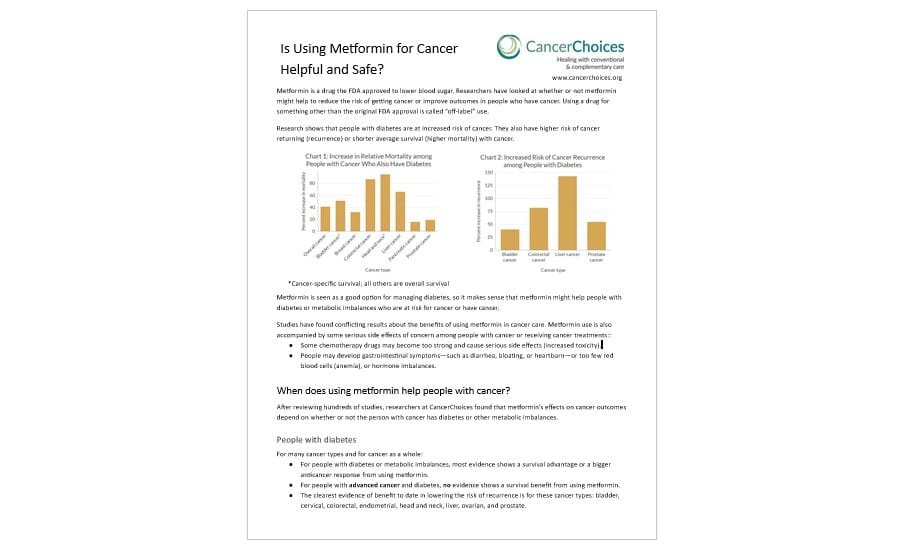Metformin, a prescription drug used to manage diabetes, has shown some benefits in lower risks of cancer and better survival, mostly among people with diabetes or high blood sugar.
Are you a health professional?
This section does not replicate the other information on this topic but provides additional details or context most relevant to professionals.
Patient education handout and poster

At the 2024 congress of the Oncology Nursing Society, we presented a poster on what research indicates about when metformin may be helpful in cancer care.

A printable two-page patient education handout explains what research indicates about when metformin may be helpful in cancer care.
Use in telemedicine
Metformin was found appropriate for prescription via telemedicine among people with prostate cancer in a small RCT.1Galsky MD, Shahin M et al. Telemedicine-enabled clinical trial of metformin in patients with prostate cancer. JCO Clinical Cancer Informatics. 2017 Nov;1:1-10.
Modes of action: metabolic factors
An article published in 2021 discusses metformin’s effects on cell signaling pathways, metabolism, growth, proliferation, inflammation, tumorigenesis and senescence. Metformin modulates immune response, autophagy, mitophagy, endoplasmic reticulum stress and apoptosis, and exerts epigenetic effects. It protects against oxidative stress and genomic instability, preserves telomere length, and prevents stem cell exhaustion.2Ala M, Ala M. Metformin for cardiovascular protection, inflammatory bowel disease, osteoporosis, periodontitis, polycystic ovarian syndrome, neurodegeneration, cancer, inflammation and senescence: What is next? ACS Pharmacology and Translational Science. 2021 Nov 1;4(6):1747-1770.
Metformin asserts indirect effects on the tumor microenvironment, such as lowering inflammation and blood glucose.3Coyle C, Cafferty FH, Vale C, Langley RE. Metformin as an adjuvant treatment for cancer: a systematic review and meta-analysis. Annals of Oncology. 2016;27(12):2184-2195; Li D, Yeung S-CJ, Hassan MM, Konopleva M, Abbruzzese JL. Anti-diabetic therapies affect risk of pancreatic cancer. Gastroenterology. 2009;137(2):482-488; Kasznicki J, Sliwinska A, Drzewoski J. Metformin in cancer prevention and therapy. Annals of Translational Medicine. 2014;2(6):57. It also reduces the amount of circulating estrogen and testosterone, both of which can stimulate the growth of hormone-dependent tumors such as breast cancer and prostate cancer.4Lawenda, BD. Metformin supplementation and cancer treatment. Integrative Oncology Essentials. February 19, 2013. Viewed August 11, 2022.
Metformin accumulates in colonic tissues, which may contribute to the reduced risk of colorectal cancer associated with metformin use.5Paleari L, Burhenne J et al. High accumulation of metformin in colonic tissue of subjects with diabetes or the metabolic syndrome. Gastroenterology. 2018 Apr;154(5):1543-1545.
Notable preclinical evidence
Notable preclinical evidence is presented here; clinical evidence is summarized in How can metformin help you? What the research says ›
Treatment response
- Reduced insulin-induced oxaliplatin resistance in a cell study6Liu C, Liu Q et al. Metformin revert insulin-induced oxaliplatin resistance by activating mitochondrial apoptosis pathway in human colon cancer HCT116 cells. Cancer Medicine. 2020 Jun;9(11):3875-3884.
- Increased sensitivity to radiation and enhanced tumor response to irradiation in a cell study7Song CW, Lee H et al. Metformin kills and radiosensitizes cancer cells and preferentially kills cancer stem cells. Scientific Reports. 2012;2:362.
- Possibly increased efficacy of immunotherapy8Cha JH, Yang WH et al. Metformin promotes antitumor immunity via endoplasmic-reticulum-associated degradation of PD-L1. Molecular Cell. 2018 Aug 16;71(4):606-620.e7.
Cancer as a whole
- Decreased metastatic cases in preclinical studies9Ding L, Liang G et al. Metformin prevents cancer metastasis by inhibiting M2-like polarization of tumor associated macrophages. Oncotarget. 2015 Nov 3;6(34):36441-55.
Breast cancer
- Downregulated a series of pro-tumorigenic micro-RNAs following metformin treatment in breast cancer cells10Zhou Y, Zhang X, Gu C, Xia J. Diabetes mellitus is associated with breast cancer: systematic review, meta-analysis, and in silico reproduction. Panminerva Medica. 2015 Sep;57(3):101-8.
- Resensitized breast cancer cell lines to doxorubicin, either alone or in combination with tamoxifen, and reversed multidrug resistance11Davies G, Lobanova L et al. Metformin inhibits the development, and promotes the resensitization, of treatment-resistant breast cancer. PLoS One. 2017 Dec 6;12(12):e0187191.
Colorectal cancer
- Increased oxaliplatin chemosensitivity in colorectal cancer cells from people with high blood glucose levels (126 mg/dl or higher) when treated with metformin in a lab study12Yang IP, Miao ZF et al. High blood sugar levels but not diabetes mellitus significantly enhance oxaliplatin chemoresistance in patients with stage III colorectal cancer receiving adjuvant FOLFOX6 chemotherapy. Therapeutic Advanced in Medical Oncology. 2019 Aug 20;11:1758835919866964.
Endometrial cancer
- Enhanced the effects of paclitaxel in endometrial cancer cells.13Hanna RK, Zhou C et al. Metformin potentiates the effects of paclitaxel in endometrial cancer cells through inhibition of cell proliferation and modulation of the mTOR pathway. Gynecologic Oncology. 2012 May;125(2):458-69125 (2012) 458–469.
Melanoma
- Inhibited tumor cell metabolism and increased T-cell activation in melanoma cell studies; induced regressions and tumor clearance in mice14Scharping NE, Menk AV, Whetstone RD, Zeng X, Delgoffe GM. Efficacy of PD-1 blockade is potentiated by metformin-induced reduction of tumor hypoxia. Cancer Immunology Research. 2017 Jan;5(1):9-16.
Managing side effects: cognitive impairment
- Prevented cognitive impairment due to cisplatin via treatment with metformin prior to cisplatin treatment15Zhou W, Kavelaars A, Heijnen CJ. Metformin prevents cisplatin-induced cognitive impairment and brain damage in mice. PLoS ONE. 2016;11(3):e0151890.
Helpful links for professionals
Cejuela M, Martin-Castillo B, Menendez JA, Pernas S. Metformin and breast cancer: Where are we now? International Journal of Molecular Sciences. 2022 Feb 28;23(5):2705.
Kamarudin MNA, Sarker MMR, Zhou JR, Parhar I. Metformin in colorectal cancer: molecular mechanism, preclinical and clinical aspects. Journal of Experimental and Clinical Cancer Research. 2019 Dec 12;38(1):491.
Barczyński B, Frąszczak K, Kotarski J. Perspectives of metformin use in endometrial cancer and other gynaecological malignancies. Journal of Drug Targeting. 2022 Apr;30(4):359-367.
Cancer Strategies Journal: Clinical Pearls, Summer 2013 ›
See “Off-label use of metformin”
Health professional comment
We invite health professionals to contribute expertise or send us questions.
"*" indicates required fields
References
